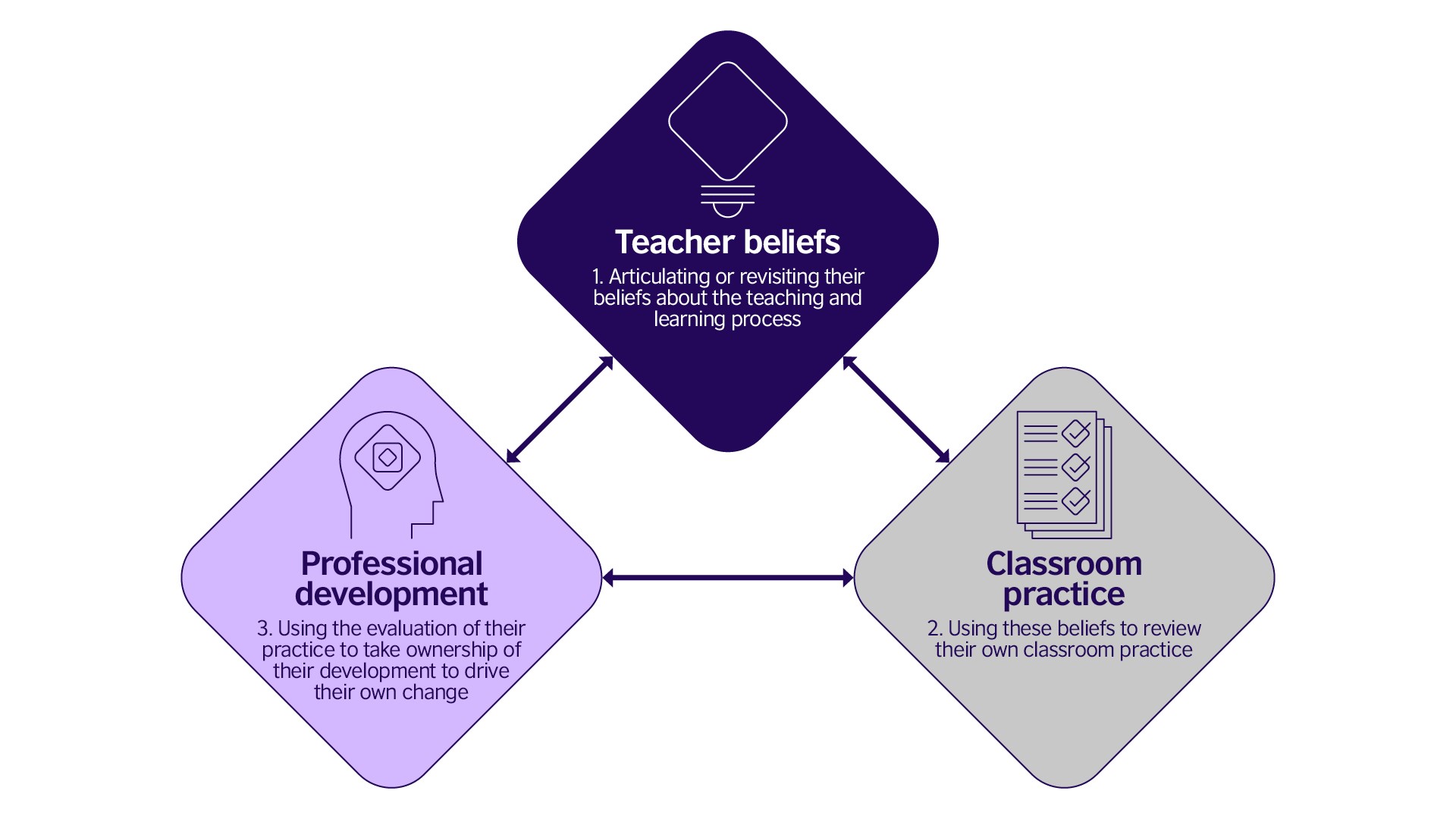Multilingual approaches to English language teaching
Multilingual approaches to English language teaching: what does this mean for assessment? In today’s classrooms and workplaces, English often acts as a bridge; a common language that connect...
Future of English


.png)
.png)
In this article we explore the role of teacher beliefs and values on teaching practices. Mina Patel is a researcher at British Council and co-author of the landmark publication The Future of English: Global Perspectives. Mina discusses teacher beliefs, agency and self-evaluation as important elements of effective professional development, especially at a time when the rise of technology has given new meaning to independent learning.
Different factors influence what happens in the classroom. The curriculum and the resources available influence classroom practice and often these are decided for the teacher. However, what a teacher believes about the teaching and learning process and their role within it also shapes what happens in the classroom. The recent Pandemic is testimony to their resilience and dedication and our recent research identified teachers as continuing to have a critical role in education, despite technological advances. Teachers are important change agents and as such need to continuously develop and grow to continue to offer their students relevant, interesting and effective learning opportunities.
Teachers’ beliefs about education generally, the teaching and learning process and their own professional development drive practice and hopefully drive further development. Professional development can be institutional and driven by schools and governments, but it can also be personal, driven by one’s own interests and desire to know more about a particular aspect of teaching and learning. The implications of this professional development are considerable and multi-faceted at all levels of the education system: policy, institution and individual. We saw this throughout the Pandemic as teachers adapted their methods and adopted new ways of teaching. Teachers themselves became learners, taking ownership of what they wanted and needed to learn. Using their agency, they became better informed and improved classroom practices, helping to optimise the teaching and learning experience.
If we think about individual professional development and how teachers can support themselves, below are three suggested steps:

Teachers may already do this unknowingly but sometimes it is good to articulate it. Recording this on-going process can show us how much we are developing and that can be motivating in itself.
Teachers, policy makers and academics are having to think about adapting not only teaching methods, but the type of content they use and how it is delivered. Partly, this is in response to how technology is changing everything. Partly because learners have also changed as a result of the Pandemic. They have changed in different ways in different contexts. For some, learning has become much more independent and less reliant on teachers. Learners are more aware of possibilities and opportunities; they are more engaged and more present in the learning process. However, in some places in the world, there are concerns about teacher capacity. Are there enough English teachers? Or rather, are there enough skilled English teachers? What we ask of teachers is changing and different skillsets are needed, including the ability to leverage technology as a tool to expand teaching and learning.
Technology has become an essential part of teaching in large parts of the world. But is technology a help or a hindrance? Do teachers like it? Can teachers exploit it effectively? Some countries are talking about AI but what about those who do not have access at all? The need to adapt to the demand for technology is almost inevitable. Can teachers drive technological change in their own classrooms? Do they have the skills? Do they have the agency? Perhaps some do. However, it is safe to say that without the necessary skills and resources to adopt and implement the technological innovations the developments they are able to make are limited.
The need to adapt and change teaching methods according to various demands and the needs of learners will continue to be an inevitable part of education systems. What will teaching look like in ten years? How will the role of the teacher change? Use the comments section below to share your thoughts and join the conversation.
There are numerous resources available to support practitioners and learners. You can find professional development resources and support on our Teaching English website.
Mina’s thoughts draw on the themes from The Future of English: Global Perspectives such as the impact of technology on learning and professional development. Download a free copy of the book here: https://www.britishcouncil.org/future-of-english
.png?width=2000&name=FOE_Book%20visual%20(1).png)
How we learn and speak English is evolving, with significant implications for educational institutions, government agencies, NGOs and policy makers. Learn about these findings and more in our book.
Teachers
Multilingual approaches to English language teaching: what does this mean for assessment? In today’s classrooms and workplaces, English often acts as a bridge; a common language that connect...
Teachers
Artificial intelligence (AI) is transforming classrooms worldwide – and English language learning is no exception. With AI-powered tools offering round-the-clock access to powerful resources...
Teachers
Beyond LLMs: How AI-powered data analysis of your language assessments can provide critical learning insights For many of us, artificial intelligence (AI) has become synonymous with large la...
Teachers
Your AI-detection tools may be biased against speakers of other languages – is there a better way? AI-detection tools are now common in schools, universities, and training organisations. The...
Teachers
Artificial Intelligence (AI) is reshaping education, offering tools that personalise learning, enhance accessibility, and support teachers. For neurodivergent learners, particularly those wi...
Teachers
In an age of voice notes, podcasts, and TikTok monologues, it’s worth asking: is speaking becoming more important than writing? As we navigate a world increasingly driven by digital platform...
Teachers
Since launching The Future of English: Global Perspectives in April 2023, the Future of English research programme has grown and flourished. New research projects have been commissioned and ...
Teachers
English is one of the most spoken languages in the world, but what will English look like in the future? Here Mina Patel, one of the authors of the new British Council publication ‘The Futur...
Teachers
In this article we explore the role of teacher beliefs and values on teaching practices. Mina Patel is a researcher at British Council and co-author of the landmark publication The Future of...
Teachers
We are living through a period where the pace of change seems relentless. This changing world has implications for the use and the teaching of the English language. Change creates opportunit...